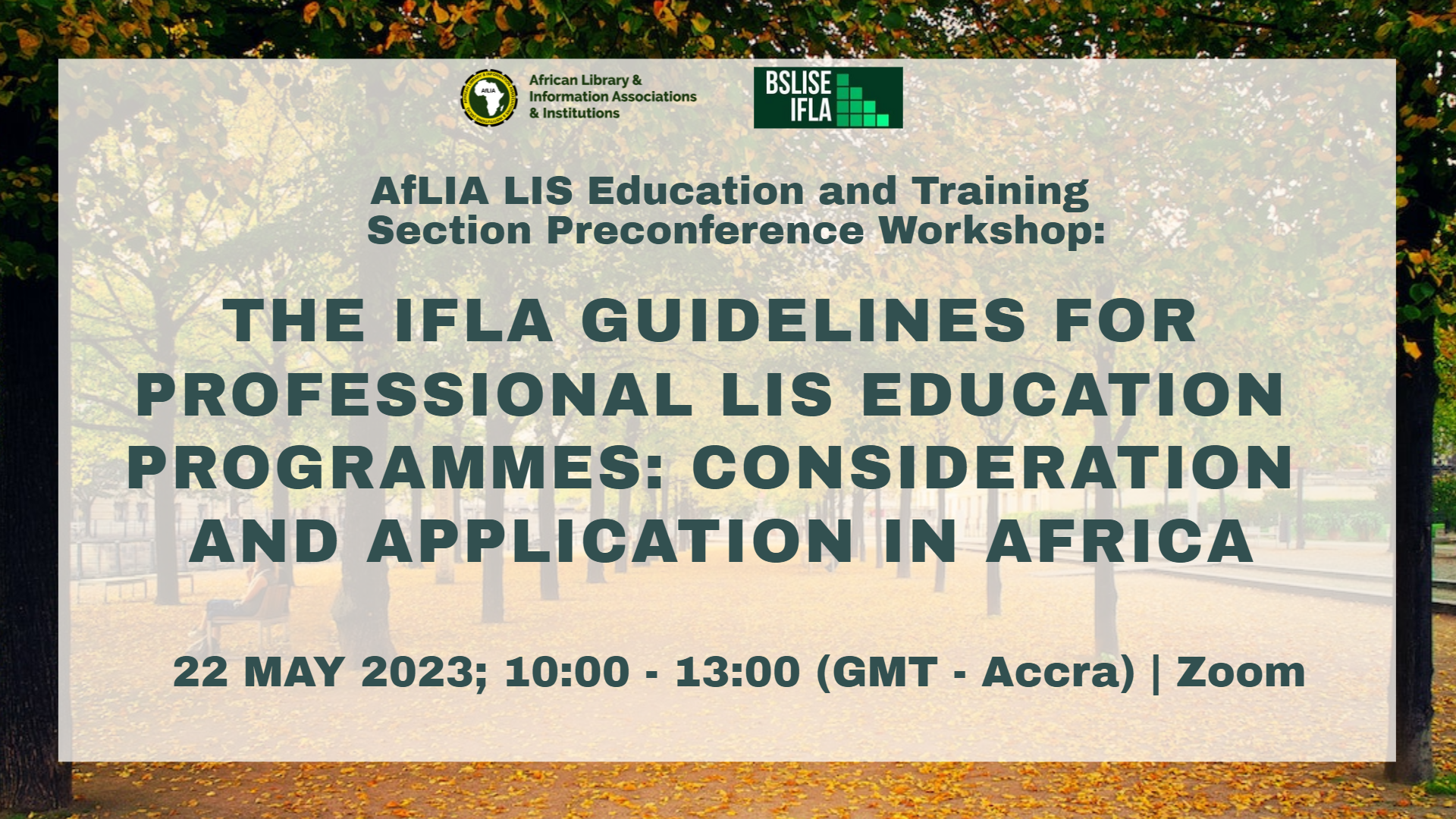AfLIA LIS Education and Training Section Pre-conference Workshop

5th AfLIA Conference and 7th African Library Summit
Theme: Future of learning, libraries and sustainable development in Africa
22-26 May 2023; Accra, Ghana
LIS Education and Training Section Pre-conference Workshop:
The IFLA Guidelines for Professional LIS Education Programmes: Consideration and Application in Africa
22 May 2023; 10:00 -13:00 (GMT – Accra) | Zoom
Context
LIS professionals, educators, students, associations and stakeholders will engage in the application of the new IFLA Guidelines for Professional LIS Education Programmes for the African context. This engagement is critical as local contexts around the world (African contexts included) all have unique expectations and infrastructures that guide the quality and development of LIS education and preparation for professional practice. The intention of the workshop is to inspire, enable and connect the African LIS community in promoting educational excellence.
Aim and scope of the workshop
The proposed workshop aims to engage LIS professionals, educators, students, associations and stakeholders in the application of the new IFLA Guidelines for Professional LIS Education Programmes for the African context/s. It will begin with an introduction of the Guidelines to set the context, followed by small group critical discussions on the promotion of the Guidelines, its usage as a tool for the development of quality in LIS education, and the challenges in implementation of the Guidelines. The workshop will conclude with an understanding of the support infrastructure at IFLA to implement the Guidelines. This active engagement is critical for appropriate translation of the Guidelines for local contexts (such as those in Africa) by governments, associations, institutions, accreditation agencies, and others.
Target audience
- LIS professionals,
- educators,
- students,
- associations and
- other relevant stakeholders in the application of the new IFLA Guidelines for Professional LIS Education Programmes.
Registration details
This is a virtual workshop that will be held on Zoom. Register in advance for this meeting:
After registering, you will receive a confirmation email containing information about joining the meeting.
Pre-workshop preparation
- Participants are requested to read the Guidelines ahead of the workshop
Facilitators
- Prof. Clara M. Chu, University of Illinois at Urbana-Champaign (United States)
- Prof. Jaya Raju, University of Cape Town (South Africa)
- Dr. Andiswa Mfengu, University of Cape Town (South Africa)
Schedule
| Time (GMT) | Activity |
| 10:00-10:10 | Welcome and Introduction |
| 10:10-10:25 | Presentation of Guidelines |
| 10:25-10:45 | Guidelines Q&A |
| 10:45-11:45 | Breakout discussion to address the following three issues from individual African/institutional contexts (a) Promotion of the Guidelines – brainstorm ideas, then identify the action(s) the participants wish to take on and others who will collaborate. These actions should be documented online. (b) Usage of the Guidelines as a tool for the development of quality in LIS education – brainstorm ideas, then identify the action(s) the participants wish to take on and others who will collaborate. These actions should be documented online. (c) Challenges in implementation of the Guidelines – identify challenges and how to address the challenges, including who (participants, others, IFLA and/or Stewardship Committee) may help and collaborate. These actions should be documented online. Participants may be divided randomly, can self-select, or be organized into specific groups. Each breakout room will need a discussion leader and rapporteur. |
| 11:45-12:30 | Reporting out and discussion |
| 12:30-12:50 | Establish and commit to an action plan |
| 12:50-13:00 | Conclusion |
Follow-up and monitoring of implementation progress
Where: At an AfLIA LIS education webinar or workshop
When: 4-month post-workshop advisory meeting and 1-year post workshop reflection meeting
What: Assess outcomes of action plans and implementation identified at the workshop – what worked, what did not work, what are the challenges, what further support is needed and from whom.
Resources
- Chu, C.M.; Raju, J. et al. (2022). IFLA Guidelines for Professional Library and Information Science (LIS) Education Programmes. IFLA. https://repository.ifla.org/handle/123456789/1987
- IFLA BSLISE (Building Strong LIS Education) Working Group https://bslise.org/
